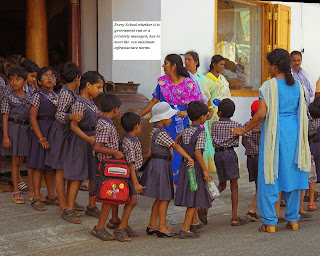The RTE Act 2009
envisages that the education is a fundamental right of every child who is
between 6 and 14 years of age. This legal enactment echoes a right-based
approach to the education of our children. The sole purpose behind this
right-based approach is to maximize the development of children, so that they
become citizens who are aware of their other rights, and come to know how to
demand these rights. This Act serves as a building block to ensure that every
child has his or her right (as an entitlement) to get a quality elementary
education. The RTE Act focuses on the right of access to education. The most noteworthy provision in the RTE Act
is the one that addresses this crucial right of access to free compulsory and
quality education up to class eight for all children. This right extends to all
children irrespective of gender, religion, class, caste and includes those with
physical and other disabilities. Since, it is a fundamental right; it is
State’s duty to ensure that no child remains out of school.
envisages that the education is a fundamental right of every child who is
between 6 and 14 years of age. This legal enactment echoes a right-based
approach to the education of our children. The sole purpose behind this
right-based approach is to maximize the development of children, so that they
become citizens who are aware of their other rights, and come to know how to
demand these rights. This Act serves as a building block to ensure that every
child has his or her right (as an entitlement) to get a quality elementary
education. The RTE Act focuses on the right of access to education. The most noteworthy provision in the RTE Act
is the one that addresses this crucial right of access to free compulsory and
quality education up to class eight for all children. This right extends to all
children irrespective of gender, religion, class, caste and includes those with
physical and other disabilities. Since, it is a fundamental right; it is
State’s duty to ensure that no child remains out of school.
The RTE Act has the
following major provisions:
following major provisions:
- Every child between the ages of six to
fourteen years shall have the right to free and compulsory education in a
neighbourhood school, till completion of elementary education. - The Act clarifies that ‘compulsory education’
means obligation of the appropriate government to provide free elementary
education and ensure compulsory admission, attendance and completion of
elementary education to every child in the six to fourteen age group. - The Act also clarifies that ‘free education’
means, no child shall be liable to pay any kind of fee or charges or expenses
which may prevent him or her from pursuing and completing elementary education.
In other words, there is no direct (school fees) or indirect cost (uniforms,
textbooks, mid-day meals, transportation) to be borne by the child or the
parents to obtain elementary education. The government will provide schooling
free-of-cost until a child’s elementary education is completed. - Where a child above six years of age has not
been admitted to any school or though admitted, could not complete his or her
elementary education, then, he or she shall be admitted in a class appropriate
to his or her age. - This act mandates that, the children are
entitled to get quality education. - For carrying out the provisions of this Act,
the appropriate government and local authority shall establish a school, if it
is not established, within the given area, within a period of three years, from
the commencement of this Act. - The Central and the State Governments shall
have concurrent responsibility for providing funds for carrying out the
provisions of this Act. - This act also calls for a fixed
student-teacher ratio. - School teachers will need adequate professional
degree within five years or else will lose job. - School infrastructure (where there is problem)
to be improved in three years, else recognition cancelled. - Provides for 25 percent reservation for
economically weaker section and disadvantaged communities in admission to Class
one in all private schools. - It provides for appointment of appropriately
trained teachers, i.e. teachers with the requisite entry and academic
qualifications. - It prohibits (a) physical punishment and
mental harassment; (b) screening procedures for admission of children; (c)
capitation fee; (d) private tuition by teachers and (e) running of schools
without recognition. - It provides for development of curriculum in
consonance with the values enshrined in the Constitution, and which would
ensure the all-round development of the child, building on the child’s
knowledge, potentiality and talent and making the child free of fear, trauma
and anxiety through a system of child friendly and child centred learning.
